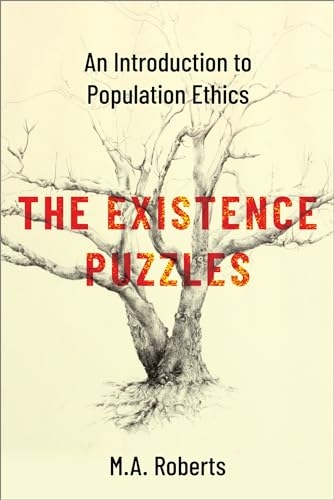
The Existence Puzzles
Oxford University Press Inc (Verlag)
978-0-19-754414-3 (ISBN)
Roberts avoids the method of presenting a theory and then applying that theory to stock problem cases. Rather, she invites the reader to work through five perplexing but riveting puzzles each rooted in the question whether bringing additional people into existence--on its own--makes the world morally better. Each of her "existence puzzles"--the Asymmetry Puzzle, the Pareto Puzzle, the Addition Puzzle, the Anonymity Puzzle, and the Better Chance Puzzle--either already is or shall soon become a critically important part of the population ethics literature. Roberts proposes solutions to the puzzles that together form a partial theory of population, a collection of principles grounded in intuition but highly sensitive to the formal demands of consistency and cogency.
M. A. Roberts is a professor of philosophy at the College of New Jersey. Her articles in population ethics have appeared in Ethics, Analysis, Theoria, Utilitas, Theory and Decision, Journal of Applied Philosophy, Law and Economics and elsewhere. She is the author of Abortion and the Moral Significance of Merely Possible Persons and Child Versus Childmaker.
Acknowledgments
Dedication
List of accepted principles and rejected principles
Lists of figures
Preface
Chapter 1: Recent history and current perplexed state of population ethics
1.1 Population variability and the inquiry into existential status
1.2 The case of Jaime versus Harry
1.3 A quick turn back to traditional total view
1.4 More than one way to maximize: maximizing on the aggregate; maximizing on the individual
1.5 Are hormones to blame?
1.6 Conceptual necessities also puzzle pieces; more inventive approaches on hold
1.7 The puzzle method; the role of intuition; the off ramp
1.8 Connection thesis; accessibility relation
1.9 Five existence puzzles
Chapter 2: The Asymmetry Puzzle
2.1 The miserable child case and the happy child case
2.2 The puzzle
2.3 Attempts to solve the puzzle that go nowhere
2.4 The existence-sensitive solution to the asymmetry
2.5 Objections and replies
Chapter 3: The Pareto puzzle
3.1 The three option case
3.2 The puzzle
3.3 Attempts to solve the puzzle by tossing out some of the puzzle pieces
3.4 The Pareto minus solution to the Pareto puzzle
3.5 Objection and reply: Doesn't the Pareto minus solution violate the independence of irrelevant alternatives?
Chapter 4: The Addition Puzzle
4.1 The puzzle
4.2 Why we love addition
4.3 Inversive existence-sensitive solution to the addition puzzle
4.4 Objection and reply: Isn't inversive existence-sensitive addition circular?
4.5 Applications of inversive existence-sensitive addition
4.6 Wouldn't it be simpler to "minimize aggregate complaints"?
Chapter 5: The Anonymity Puzzle
5.1 The case of simple addition and reversal
5.2 The case of indefinitely iterated addition and reversal; the puzzle
5.3 When the cures are worse than the disease
5.4 Identity-sensitive solution to the anonymity puzzle
5.5 Objections and replies
Chapter 6: The Better Chance Puzzle
6.1 Probability questions
6.2 Expected value: the wrong way to make a wrong a right
6.3 Probable value: a better way to make a wrong a right
6.4 Objections and replies
Chapter 7: Person-based consequentialism and a New Way of Doing the Best We Can
Appendix A: Nonexistence Comparability
Appendix B: The Loss Distinction Thesis
Appendix C: Broome on the Neutrality Intuition
Index
Bibliography
| Erscheinungsdatum | 17.01.2024 |
|---|---|
| Zusatzinfo | 20 |
| Verlagsort | New York |
| Sprache | englisch |
| Maße | 201 x 145 mm |
| Gewicht | 386 g |
| Themenwelt | Geisteswissenschaften ► Philosophie ► Ethik |
| ISBN-10 | 0-19-754414-2 / 0197544142 |
| ISBN-13 | 978-0-19-754414-3 / 9780197544143 |
| Zustand | Neuware |
| Informationen gemäß Produktsicherheitsverordnung (GPSR) | |
| Haben Sie eine Frage zum Produkt? |
aus dem Bereich


